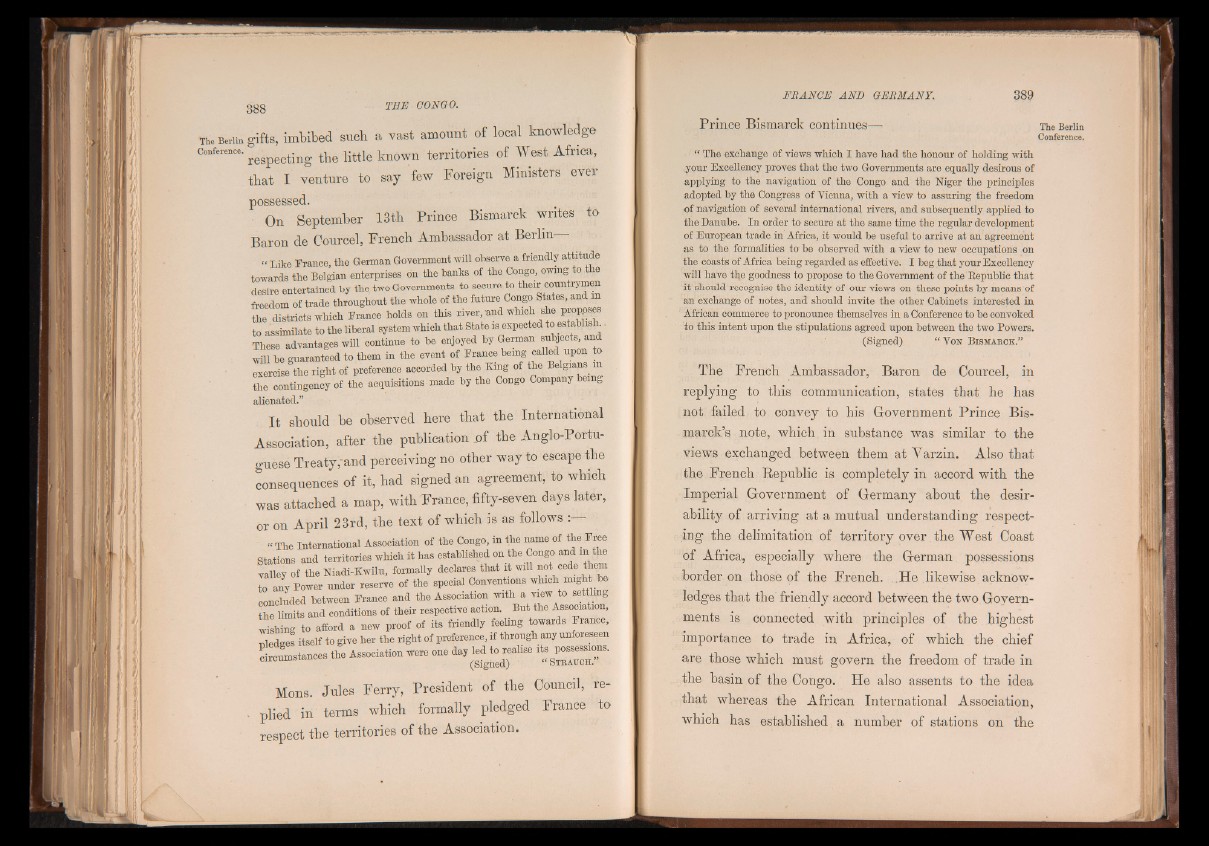
The Berlin gifts, imbibed such a vast amount of local knowledge
Conference. respecting the little kn0wn territories of West Africa,
that I venture to say few Foreign Ministers ever
possessed.
: On September 13th Prince Bismarck writes to
Baron de Courcel, French Ambassador at Berlin—
“ Like France, the German Government -will observe a friendly attitude
towards the Belgian enterprises on the banks of the Congo, owing o e
desire entertained by the two Governments to secure to their countrymen
freedom of trade throughout the whole of the future Congo States, and m
the districts which France holds on this river, and which she proppse
to assimilate to the liberal system which that State is expected to establish..
These advantages will continue to be enjoyed by German subjects and
will be guaranteed to them in the event of France being called upon
exercise the right of preference accorded by the King of the Belgians m
the contingency of the acquisitions made by the Congo Company being
alienated.”
I t should be observed here that the International
Association, after the publication .of the Anglo-Portu-
guese Treaty,'and perceiving no other way to escape the
consequences of it, had signed an agreement, to which
was attached a map, with France, fifty-seven days later,
or on April 23rd, the text of which is as follows
1 The International Association of the Congo, in the name of the Free
Stations and territories which it has established on the Congo and intlm
valley of the Niadi-Kwilu, formally declares that it will not cede them
to any Power under reserve of the special Conventions which might be
concluded between France and the Association with a view to settling
the limits and conditions of their respective action. But the Association,
wishing to afford a new proof of its friendly feeling towards France,
pledges itself to give her the right of preference, if through any unforeseen
* . i— — ¡ g j -
Mons. Jules Ferry, President of the Council, re-
•' plied in terms which formally pledged France to
respect the territories of the Association.
Prince Bismarck continues—v-'*
“ The exchange of views which I have had the honour of holding with
your Excellency proves that the two Governments are equally desirous of
applying to the navigation of the Congo and the Niger the principles
adopted by the Congress of Vienna, with a view to assuring the freedom
of navigation of several international rivers, and subsequently applied to
the Danube. In order to secure at the same time the regular development
of European trade in Africa, it would be useful to arrive at an agreement
as to the formalities to be observed with a view to new occupations on
the coasts of Africa being regarded as effective. I beg that your Excellency
will have the goodness to propose to the Government of the Republic that
it should recognise the identity of our views on these points by means of
an exchange of notes, and should invite the other Cabinets interested in
African commerce to pronounce themselves in a Conference to be convoked
to this intent upon the stipulations agreed upon between the two Powers.
(Signed) “ Von Bismabck.”
The French Ambassador, Baron de Courcel, in
replying to this communication, states that he has
not failed to convey to his Government Prince Bismarck’s
note, which in substance was similar to the
views exchanged between them at Yarzin. Also that
the French Republic is completely in accord with the
Imperial Government of Germany about the desirability
of arriving at a mutual understanding respecting
the delimitation of territory over the West Coast
of Africa, especially where the German possessions
border on those pf the French. ..He likewise acknowledges
that the friendly accord between the two Governments
is connected with principles of the highest
importance to trade in Africa, of which the chief
are those which must govern the freedom of trade in
the basin of the Congo. He also assents to the idea
that whereas the African International Association,
which has established a number of stations on the
The Berlin
Conference.